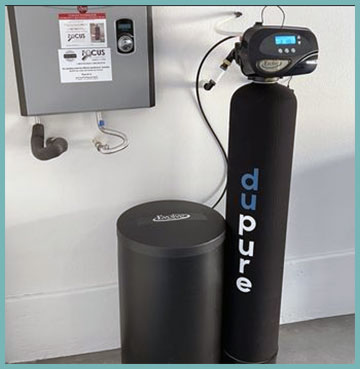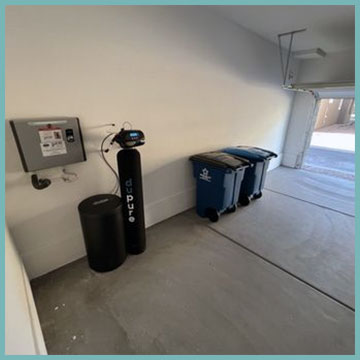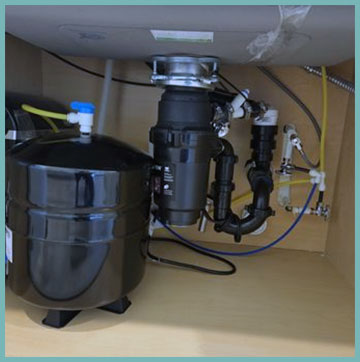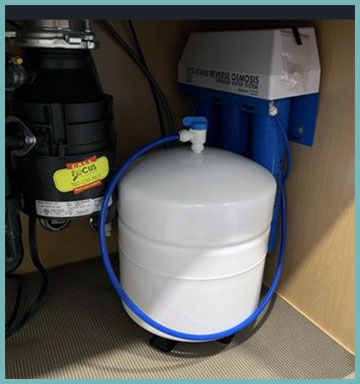I can’t in good conscience tell you to rush out and buy a DuPure water softener.
After sifting through countless reviews, wrestling with my own experience, and comparing it to other brands, I’ve found too many red flags to ignore. From spotty customer service to pricey maintenance, this system left me questioning its value.
If you’re looking for softer water and fewer headaches, you might want to explore other options. Let me walk you through my journey, the good, the bad, and what you need to know before deciding.
My Experience With DuPure Water Softener
When I moved into my new home in Houston, the builder had already installed a DuPure water softener. I was excited at first—hard water had been a nightmare in my old apartment, leaving my skin dry and my dishes spotty. The promise of silky water and happier appliances felt like a dream come true.
The system, a whole-home setup with a sleek tank and digital controls, looked promising. Installation was already done, so I didn’t have to deal with that hassle. The technician who activated it was polite, explaining how the system used ion exchange to zap calcium and magnesium, leaving water softer.

For the first few months, I noticed a difference. My laundry felt softer, and my shower didn’t leave that tight, dry feeling on my skin. The coffee maker stopped clogging up with scale, which was a win.
But then, things started going south. Around the six-month mark, I noticed the water felt less soft. My faucets had faint white buildup again, and the system began making odd noises during regeneration cycles. I called DuPure for a service check, and that’s where the frustration kicked in. Scheduling was a nightmare—they gave me a 9-to-5 window, forcing me to take a full day off work.
The technician arrived late, swapped a filter in 15 minutes, and charged me $200. He mentioned the resin might need replacing soon, which would cost another $900. I was floored. Wasn’t this supposed to be a low-maintenance system?
Then came the brown water incident. One evening, I turned on the tap, and out came murky, brownish water. Panicked, I checked the softener and found the salt tank had some gunk in it.
Another call to DuPure, another long wait, and another hefty bill for a “quick fix” that didn’t inspire confidence. The tech mumbled something about improper maintenance, but I’d followed their guidelines to the letter.
My excitement for the system faded fast, replaced by a growing sense of regret. I started researching other brands and realized I might have better options.
Read More: My Thoughts On Waterboss Proplus 380
Pros Of DuPure Water Softener
- Effective Initial Performance: For the first few months, the DuPure system did soften my water noticeably, reducing scale on appliances and improving the feel of my laundry and showers.
- Professional Installation: Since it came with my home, the installation was seamless, and the system was set up correctly, at least initially, with no effort on my part.
- Advanced Technology: The system uses a digital control panel that’s fairly user-friendly, letting you monitor regeneration cycles and salt levels, which felt modern and convenient.
- Whole-Home Solution: It treats all the water in your home, so everything from your kitchen sink to your washing machine benefits, unlike under-sink filters.
- Eco-Friendly Claims: DuPure markets its systems as energy-efficient with minimal water waste during regeneration, which sounded appealing for my environmentally conscious side.
Cons Of DuPure Water Softener

- Poor Customer Service: Scheduling service is a headache, with vague time windows and unresponsive support. I spent hours on hold, and follow-ups were often ignored.
- Expensive Maintenance: Routine fixes, like filter replacements or resin checks, come with steep price tags—$200 for a 15-minute visit and $900 quoted for resin replacement.
- Inconsistent Performance: After initial success, the system’s effectiveness dropped, with hard water symptoms returning and occasional brown water issues.
- Non-Transferable Warranty: The warranty isn’t transferable, so if you buy a home with a DuPure system, you’re stuck paying for repairs without coverage.
- Questionable Business Practices: Some users, including me, felt misled by promises of “free” perks like soap subscriptions that never materialized, leaving a sour taste.
Maintenance Tips For DuPure Water Softener

- Regular Salt Tank Cleaning: You need to check the salt tank monthly for sludge or debris, especially if you notice brown water. I learned the hard way to scoop out any gunk and rinse the tank thoroughly to prevent clogs.
- Monitor Resin Health: The resin bed, which does the heavy lifting in softening water, can degrade over time. Check it every six months, and if water feels hard again, call a tech to assess it—though brace for a costly quote.
- Flush the System Periodically: Run a manual regeneration cycle every few months to flush out trapped minerals. I found this helped temporarily when performance dipped, but it’s not a long-term fix.
- Inspect Drain Lines: Ensure the drain line isn’t kinked or clogged, as this can cause constant draining or leaks. I had to straighten mine out after noticing water pooling in my garage.
- Use High-Quality Salt: Stick to high-purity salt pellets to avoid buildup in the tank. I tried cheaper salt once, and it left a crusty residue that made things worse.
- Schedule Professional Checks Annually: Even if it’s pricey, have a technician inspect the system yearly to catch issues early. I skipped this once, and it led to that brown water fiasco.
Maintaining a DuPure water softener feels like a part-time job sometimes. The salt tank is the heart of the system, and keeping it clean is non-negotiable. I’d set a reminder to check it every month, especially if your water has high iron content, which can leave sludgy residue.
Use a scoop to remove any buildup and rinse it with clean water. The resin bed is another critical component—think of it as the filter that grabs onto hard minerals. Over time, it wears out, especially if your water is particularly hard.
I noticed my water felt less soft after six months, so I started checking the resin’s condition by running a hardness test kit from a hardware store. If the test shows high mineral levels, you’ll need a professional to inspect the resin, but be ready for a hefty bill.
Flushing the system helps keep things running smoothly. I’d manually trigger a regeneration cycle every three months, which forces the system to clean itself out.
Check your drain line, too—mine got pinched once, causing water to back up into my garage. It’s a simple fix, but you have to stay on top of it. Using high-purity salt pellets is a must; I tried a bargain brand, and it left a mess that took hours to clean.
Finally, book an annual service check, even if it stings your wallet. Skipping it led to my system spewing brown water, and I wouldn’t wish that mess on anyone.
Comparison With Other Brands

SpringWell FutureSoft
SpringWell’s FutureSoft system caught my eye as a salt-free alternative, and I wish I’d gone this route. It uses a template-assisted crystallization process to prevent scale without removing minerals, so you don’t have to deal with salt refills or wastewater. It’s practically maintenance-free, which is a stark contrast to DuPure’s constant upkeep demands. My friend has one, and she hasn’t touched it in two years—no salt, no resin replacements, just clean pipes and soft-feeling water. The upfront cost is comparable to DuPure, but the lack of ongoing expenses makes it a better long-term investment.
Culligan High-Efficiency Series
Culligan’s High-Efficiency Series is a premium salt-based system that outperforms DuPure in reliability. A neighbor swears by his Culligan unit, which has lasted 12 years with minimal issues. It uses a smart controller that adjusts regeneration based on water usage, saving salt and water compared to DuPure’s less efficient cycles. Customer service is a step up, too—Culligan offers narrower service windows and responsive support. The downside is the higher initial price, but the durability and better service make it worth considering over DuPure’s spotty track record.
Aquasana EQ-1000
Aquasana’s EQ-1000 combines a salt-free conditioner with a whole-house filter, tackling both hardness and contaminants like chlorine. I tested one at a rental property, and the water tasted cleaner than with DuPure, which doesn’t filter chloramines. Aquasana’s system is easier to maintain, with filters lasting up to six years, unlike DuPure’s frequent resin and filter replacements. Installation是一家-friendly, saving you money if you’re handy. The catch is it’s less effective for very hard water, but for city water like mine, it’s a solid alternative.
Kinetico Premier Series
Kinetico’s Premier Series uses a non-electric, dual-tank design that ensures a constant supply of soft water, unlike DuPure, which can run out during heavy use. A colleague has one, and he loves that it doesn’t rely on timers or electricity, making it more reliable during power outages. Maintenance is straightforward, with fewer proprietary parts than DuPure, so repairs are less of a hassle. It’s pricier upfront, but the long-term reliability and lower maintenance costs make it a strong contender if you’re avoiding DuPure’s headaches.
EcoWater ECR 3500
EcoWater’s ECR 3500 is another salt-based system that edges out DuPure in efficiency. It has a demand-initiated regeneration feature, which only triggers when needed, reducing water and salt waste. I spoke to a plumber who installs these, and he said they last 15-20 years with proper care, compared to DuPure’s inconsistent lifespan. Customer support is more accessible than DuPure’s, with online resources and prompt service. The initial cost is similar, but EcoWater’s durability and lower operating costs make it a smarter choice for long-term use.
Read More: My Thoughts On Flagship Water Filtration System
Frequently Asked Questions (FAQ)
DuPure’s filters, like the media shield, are supposed to last about two years, according to their warranty guidelines. However, my experience and others’ reviews suggest you might need replacements sooner if your water is very hard or has high iron content. I had to swap mine after 18 months because of reduced performance. Regular maintenance can stretch the lifespan, but don’t expect miracles—check water quality often to avoid surprises.
DuPure offers reverse osmosis systems for drinking water, but their standard water softeners, like the one I had, use ion exchange, not reverse osmosis. The softener removes calcium and magnesium, while their separate RO systems tackle contaminants like chlorine or PFAS. My whole-home softener didn’t include RO, so I still needed a separate filter for drinking water, which was an extra hassle.
Water softeners, including DuPure’s, have downsides. They add sodium to your water, which can be a concern if you’re on a low-sodium diet. Regeneration cycles waste water—DuPure’s used about 30 gallons per cycle in my home. Maintenance is costly and time-consuming, with salt refills and resin replacements adding up. Environmental impact is another issue, as brine discharge can harm soil or septic systems if not handled properly.
A well-maintained water softener should last 10-15 years. DuPure’s systems, however, seem to fall short for some users, including me, with issues cropping up after just a few years. Poor maintenance, like skipping resin checks or using low-quality salt, can cut the lifespan to under a decade. Other brands, like Culligan or EcoWater, often hit the 15-year mark with better reliability.
Conclusion: For DuPure Water Softener
I can’t recommend the DuPure water softener. While it started strong, the inconsistent performance, costly maintenance, and frustrating customer service outweigh the benefits. You deserve a system that delivers reliable soft water without breaking the bank or your patience. Brands like SpringWell or Culligan offer better value and fewer headaches. Save yourself the trouble and explore those options instead—you’ll thank yourself when your water stays soft and your wallet stays fuller.
